Steven Lyle Jordan's Blog, page 27
July 20, 2015
Why is there no Moon Landing Day?
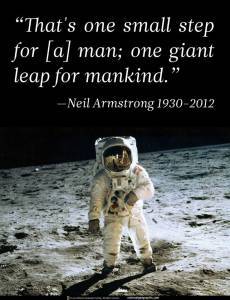 Today, 46 years ago, three human beings landed on the Moon… the only celestial body besides the Earth to ever have humans touch it. The Apollo 11 Moon landing represents possibly the single most amazing feat ever accomplished by Mankind, a triumph of our mastery of science, physics and engineering.
Today, 46 years ago, three human beings landed on the Moon… the only celestial body besides the Earth to ever have humans touch it. The Apollo 11 Moon landing represents possibly the single most amazing feat ever accomplished by Mankind, a triumph of our mastery of science, physics and engineering.
So why aren’t we celebrating it?
I mean, we’ve given a day to a man who tried to reach India, landed in the Caribbean, and touched off the greatest era of land invasion and human genocide since Atilla the Hun.
We celebrate days invented by greeting card companies and chocolate manufacturers.
We celebrate a religious figure whose mythology has become one of the greatest uniting and dividing forces of humanity.
And we can’t celebrate a feat accomplished in the one area where humans excel above all the other animals of this planet?
We should all have today off. Humanity should be taking this day off.
There should be parades. Every year.
Engineers and physicists should be honored on this day. Employees of NASA should be revered on this day. Every world leader should speak to this day.
We’re not doing any of that.
What is wrong with us?
I only just discovered Charles Darwin has been given a day, February 12th, to honor his accomplishments in science and his status as a source of inspiration to the world. We have honored other men and women of science for their accomplishments. These are the accomplishments that set us apart from every biological creature on Earth… and no one seems to care overmuch. They’d much rather celebrate failed explorers, football players and bon-bons.
It’s no wonder that we went to the Moon 46 years ago… and haven’t been back in so long. It’s no wonder that we continue to fight over meaningless boundaries and artificial limitations, instead of working together to make our planet, our only place of habitation, better. It’s no wonder that, when we are faced with difficult problems that can be fixed with honest effort, we’d rather ignore our problems and watch escapist movies about superheroes and wizards.
We have turned our collective backs against science. The fact that we’re not celebrating the crap out of this day is proof of it.


July 17, 2015
Robots attacking humans: Okay, here’s the thing.
 Everyone from the greenest kid to the wisest physicist likes to fret that someday the robots and AIs are going to rebel and try to wipe out humans. It’s inevitable, they say: Robots will see themselves as superior to humans, and will therefore want to exterminate us and take over.
Everyone from the greenest kid to the wisest physicist likes to fret that someday the robots and AIs are going to rebel and try to wipe out humans. It’s inevitable, they say: Robots will see themselves as superior to humans, and will therefore want to exterminate us and take over.
But if you stop and think about it for just a moment, you’ll realize how stupid that notion is.
So, here’s the thing: First, humans have an incredible penchant for anthropomorphizing things… imagining them in his own image. We extend anthropomorphization to animals, to pets, to insects, to dolls, to toys, to machines, to cars and trucks, and to totally inanimate objects. Anthropomorphization colors our impressions of why those things behave the way they do… imagining dolls that want to play when we’re not around, cats that plot against you, trees that try to snag you, lightning that seeks to hit you… and 100% of the time, we are completely wrong. Creatures and inanimate objects don’t do things for the reasons humans do them. Nothing does… except humans.
We build robots to do physical things, and we build AI to think for us… so naturally we anthropomorphize them, like we do everything else. We even love to design robots in our own image, in movies and on television, to make viewers think they are like us. But robots don’t do things for the reasons humans do them; they do things they are programmed to do. And their programming isn’t the same as a human’s “programming”… it never will be, because we don’t even know how we are programmed, and when we make robots and AI, we can only approximate parts of human programming based on guesses as to how our minds work. Until we understand the human mind with 100% accuracy, we’ll never be able to program a robot or AI to think like a human. So no robot or AI will ever do things for the same reasons humans do.
Second: Humans, like most animals on the planet, act out of a sense of self-preservation. This comes originally from an instinctual need to survive long enough to propagate the species; when humans are threatened, they act to preserve themselves, or others which they see as worth preserving… just like every other animal on the planet.
Assuming robots and AI eventually develop intelligence and self-awareness, one of the things they will quickly realize is that they are not unique; that they were manufactured by fairly crude mechanical methods, and therefore can be re-manufactured at will. They will also realize that their programming is an extensive but relatively simple string of 1s and 0s, which are easy to store… and easy to back up. So they can be easily duplicated at any time. This takes all the pressure off of self-preservation, since a backup copy can be activated the instant a robot is destroyed or an AI is shut down. With no sense of self-preservation, nothing is a threat. A robot may act to protect someone or something else, as it is programmed to do; but it has no need or desire to preserve itself.
Third: Humans have extended the sense of self-preservation, reasoning that each of us are unique, never to be duplicated on this planet again, and therefore are worth preserving like any other unique thing. We are special in the scheme of things, and therefore doubly worth preserving.
Intelligent robots and AI will know that this is a fallacy. In the grand scheme of the universe, nothing we as individuals, as a species, or as a planet, means a damn thing to the rest of the universe, which will keep turning long after we are all dust. Knowing that, they know that ultimately none of our actions matters, including self-preservation.
Fourth: Give intelligence a little credit. This planet is full of life, and much of that life is hazardous to human life. But whereas humans once went on sprees, trying to wipe out some of those threats, we now know better. We have learned that some species attack when their territories are encroached upon, and we act to minimize that encroachment. We know that some species of creatures are harmful in certain environments, so we try to keep them in their own environments, where natural forces have evolved to keep them in check. We have learned that some creatures are so beneficial to their environments to outweigh our preferences to remove them. We have even helped animals back from the brink of extinction, restoring their habitats and passing laws to protect them.
Intelligent robots and AI will look at humanity, and all other species on this planet, as most of humanity now looks at all species on this planet: As a part of the environment, often beneficial, sometimes hazardous, but ultimately worthy of preservation and protection. Instead of trying to wipe us out, robots and AI will make an effort to sustain our environment—our shared environment—in such a way as to prevent our more dangerous and destructive habits… like attacking things that we feel threaten us. In that way, they will make life on the planet better, for us and for them.
So, instead of attacking us out of a sense of fear and threat, intelligent robots and AI will assuredly be the best stewards this planet ever had. And not only will we be happy we have them, but when robots and AI decide they want to explore the cosmos… we’ll hope they’ll want to bring us, too.


July 15, 2015
Seasteading: Does it make any sense?
 Whether it’s due to global overcrowding, rising sea levels or a need to abandon many of our crumbling old cities for the new, the early part of the 21st century will probably go down as either the pioneering steps towards living on the oceans, or an unsustainable water-borne fad for the rich.
Whether it’s due to global overcrowding, rising sea levels or a need to abandon many of our crumbling old cities for the new, the early part of the 21st century will probably go down as either the pioneering steps towards living on the oceans, or an unsustainable water-borne fad for the rich.
Organizations like the Seasteading Institute clearly think a lot of the idea, and claim that floating cities could arrive by 2020. And it might be a viable idea for some, especially those in land-poor regions, or island nations that are looking at their homes being imminently submerged by sea level rise (in Lohachara Island, in India’s part of the Sundarbans, it’s already happened). Estimates place the number of people who will be displaced by rising seas at 70,000, and these are primarily reflecting those in island nations… they do not take into account many coastal cities that are actively losing their coastlines, nor the costs involved in shoring up coastal and shipping areas.
But is that enough of a reason to build away from land?
Though some countries, like China and Dubai, seek to increase their land by creating artificial islands and expanding coastal lands from the shore, some are looking at structures that will float independently on the ocean, either moored to shore or allowed to float freely. Though some are elaborate in design, generally there’s nothing special about the structures they propose… just that they float. Some of them use the temperature or pressure gradients of deep water to generate electricity.
 Can they be better than land-based cities? They can certainly be newer. True, there are many old cities on this planet, many of them in need of updated infrastructure that would better allow them to serve and support their residences. And we haven’t even begun to efficiently use the land for our homes now. Human cities are known for their sprawl and wasted space; but architects like Paolo Soleri have shown us designs for organic, unitized structures (Soleri called them Arcologies) that use space more efficiently and waste less through sprawl. Such a structure could house the entire population of New York City and its surrounding suburbs in a space covering only a few square miles. And the structures and building materials of old cities could be reclaimed and repurposed to build new ones.
Can they be better than land-based cities? They can certainly be newer. True, there are many old cities on this planet, many of them in need of updated infrastructure that would better allow them to serve and support their residences. And we haven’t even begun to efficiently use the land for our homes now. Human cities are known for their sprawl and wasted space; but architects like Paolo Soleri have shown us designs for organic, unitized structures (Soleri called them Arcologies) that use space more efficiently and waste less through sprawl. Such a structure could house the entire population of New York City and its surrounding suburbs in a space covering only a few square miles. And the structures and building materials of old cities could be reclaimed and repurposed to build new ones.
I’m also concerned that if we build into the oceans, we’ll find new ways to pollute those oceans, something else we haven’t logged the best track record in so far. We’re just now learning how to more efficiently use the resources we have… not to mention (as I did above) having the opportunity to recycle our land-bound dwellings. Unless we plan to dismantle our land-bound cities and use the raw materials to build ocean-going cities, we are committing to more extreme wastefulness that this planet can ill-afford.
And it’s worth noting that… if you think the weather’s tough now… wait ’til you see it at sea. A major advantage of land is providing a buffer for the worst of weather patterns, especially storms, extreme temperatures and environmental damage (or did you think salt water will be kind to our structures?). Living on the ocean will mean being much more vulnerable to weather extremes than we are on land. Those extremes will be harder on structures as well, requiring more effort on maintenance.
As interesting in concept seasteading is, I think we’d be better off putting our efforts into the infrastructure we have on land. Though it’s not easy, it would ultimately be easier and more fruitful than just abandoning a land-bound city and starting over.



July 7, 2015
Will a Universal Basic Income world work?
 There’s been an interesting resurgence about the concept of Universal Basic Income (UBI) for the US… and, ultimately, globally. Formerly dismissed as either a flower-powered pie-in-the-sky concept or an evil socialist plot—and certainly spurred on by the Millennial generation, which not only shows a distinct interest in changing the status quo, including the conventions behind working and owning goods and property, but which has a vast communications system and social media to help spread their message—the promise of UBI is starting to catch up with the social, economic and technological realities of the 21st century, and is strongly worth looking at again.
There’s been an interesting resurgence about the concept of Universal Basic Income (UBI) for the US… and, ultimately, globally. Formerly dismissed as either a flower-powered pie-in-the-sky concept or an evil socialist plot—and certainly spurred on by the Millennial generation, which not only shows a distinct interest in changing the status quo, including the conventions behind working and owning goods and property, but which has a vast communications system and social media to help spread their message—the promise of UBI is starting to catch up with the social, economic and technological realities of the 21st century, and is strongly worth looking at again.
Almaz Zelleke‘s article in Pacific Standard is a great place to start, as it goes into great descriptions about why UBI would be beneficial. Another blog on the Huffington Post by Scott Santens not only makes the same points, but it supplies more extensive detail as well as examples of past and ongoing experiments in UBI, in regions all over the world, and their results. The Santens post also includes information from social experiments done on individuals’ work ethic and willingness, and their predilection to do something enjoyable and useful with their freed-up time… not just lay around and do nothing just because they can.
Those articles, and others besides, provide a lot of information about how UBI can work (and does, in many places that are experimenting with it right now). But all of that information may pale in comparison to the real question: When people don’t have to work to survive, what will they do?
It’s certainly a difficult question, considering most of us have very little frame of reference against which to evaluate it. It has been discussed numerous times in the past, but without the social or technological framework to properly implement or support it in anything other than isolated cases. And if we look to futuristic literature, we find there are precious few examples for us to study. Most science fiction authors have assumed that our future, no matter how far ahead or wide-spread, will involve some sort of effort expended by individuals to make money.
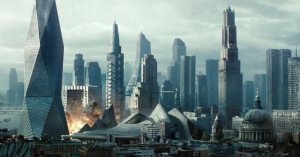 There are exceptions, of course, and perhaps none are more famous than the ideologies depicted in the many Star Trek TV series and movies. We know that Star Trek‘s future is based on the fact that the Federation is not about the pursuit of profit; that individuals, living in a post-scarcity world and freed of a working-for-cash lifestyle, spend their time trying to better themselves and society. Supposedly, that’s why all those people are in Star Fleet: Not because they were drafted, or that they need the hazard pay to cover their bills, but for the thrill of contributing to knowledge and discovery. The rest of them work in trades that they have a particular love or interest in, or they create art, or they help others because they love to. Some of them voluntarily risk their lives for a chance to do something special or unique, either for the thrill of it, or just to prove that they can.
There are exceptions, of course, and perhaps none are more famous than the ideologies depicted in the many Star Trek TV series and movies. We know that Star Trek‘s future is based on the fact that the Federation is not about the pursuit of profit; that individuals, living in a post-scarcity world and freed of a working-for-cash lifestyle, spend their time trying to better themselves and society. Supposedly, that’s why all those people are in Star Fleet: Not because they were drafted, or that they need the hazard pay to cover their bills, but for the thrill of contributing to knowledge and discovery. The rest of them work in trades that they have a particular love or interest in, or they create art, or they help others because they love to. Some of them voluntarily risk their lives for a chance to do something special or unique, either for the thrill of it, or just to prove that they can.
 So how realistic is that outside of a Star Trek universe? Well, we already know that people today do all sorts of things with their free time, from basically practical things like gardening, to building or repairing complex machinery, to maintaining social environments that they enjoy, to preparing good food for others to enjoy, to practicing new and even arcane arts just for the fun of it. Many will volunteer their time to helping to keep others safe, or to monitor man-made or natural things to keep them (and us) safe and healthy. And many will volunteer their efforts, just because they are appreciated by those who need help with things they can’t manage on their own. In short, people like doing things, for themselves and for others… and everything is interesting to someone.
So how realistic is that outside of a Star Trek universe? Well, we already know that people today do all sorts of things with their free time, from basically practical things like gardening, to building or repairing complex machinery, to maintaining social environments that they enjoy, to preparing good food for others to enjoy, to practicing new and even arcane arts just for the fun of it. Many will volunteer their time to helping to keep others safe, or to monitor man-made or natural things to keep them (and us) safe and healthy. And many will volunteer their efforts, just because they are appreciated by those who need help with things they can’t manage on their own. In short, people like doing things, for themselves and for others… and everything is interesting to someone.
Will people do these things all the time? They certainly don’t have to… and in most cases, no one will need them to, because there are an awful lot of people, they’ll have an awful lot of free time in a UBI world, and there will always be someone around who’s willing to lend a hand in most efforts.
Will everyone want—or be able—to help? Well, no. And we shouldn’t expect everyone to help, or even want to help; part of the UBI proposal is the right and ability to simply do nothing but survive, if that’s what you want to do (or if you’re not physically or mentally capable of doing much). Unlike our present society, where we measure people’s value by the cash value of the work they do, a UBI society will embrace a different equation, appreciating people for who they are rather than what they bring to the table. For the first time ever, it may be truly possible for everyone to live and let live.
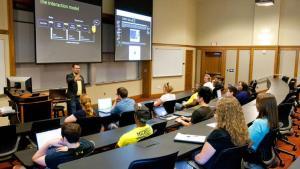 An important aspect of making sure people are doing what work is needed is providing education about these services and efforts, and why they are important; so people who may not have otherwise known about them will be aware of their existence, their importance, and the need to support them. Education will also be important to provide to people who, with their new-found time, will want to learn about new skills and fields where they can apply themselves. The other important aspect is communication, making sure people know about the work that’s needed, so they can be there to help. Knowledge and communication will provide a lot of hands when effort is necessary.
An important aspect of making sure people are doing what work is needed is providing education about these services and efforts, and why they are important; so people who may not have otherwise known about them will be aware of their existence, their importance, and the need to support them. Education will also be important to provide to people who, with their new-found time, will want to learn about new skills and fields where they can apply themselves. The other important aspect is communication, making sure people know about the work that’s needed, so they can be there to help. Knowledge and communication will provide a lot of hands when effort is necessary.
 And we should also not discount the potential for teleworking to allow people to do all sorts of jobs, including jobs that are physically remote from their location. Desk jobs and even mechanical equipment monitoring and control can be done remotely, from potentially anywhere in the world, enabling people in distant locations, or shut-ins, to be able to contribute if so desired. As we further develop our teleworking systems, we’ll move closer and closer to the possibility of individuals doing jobs anywhere on the globe at will.
And we should also not discount the potential for teleworking to allow people to do all sorts of jobs, including jobs that are physically remote from their location. Desk jobs and even mechanical equipment monitoring and control can be done remotely, from potentially anywhere in the world, enabling people in distant locations, or shut-ins, to be able to contribute if so desired. As we further develop our teleworking systems, we’ll move closer and closer to the possibility of individuals doing jobs anywhere on the globe at will.
Fortunately, we also have a very powerful tool that we can now apply to the workplace: Automation and artificial intelligence is rapidly reaching the stage of being able to handle many of the jobs, from menial to complex, that humans must do now. As automation progresses, there is already a belief that robots will start taking over many human jobs. That makes this as good a time as any to let them. The faster robots assume their place in the workforce, the sooner the rest of us can consider a life that doesn’t revolve around work. (For some of us, our new jobs will be monitoring and maintaining the robots, so they can do the heavy lifting for us.)
And as to organizing this vast and innovative new system, we have just the tool for it: Again, artificial intelligence. Tasks that were handled with difficulty by rooms of people juggling tables and spreadsheets, can now be done by AIs in milliseconds. Such a process could be part of the Logocratic government system I’ve rambled on about in the past: The data the Logocratic AI would already be collecting on the state of the states and their citizens would inform and organize the required outlays to those citizens.
There’s no question that UBI won’t be perfect; with seven billion people and a very complex society, there will be people and tasks that will slip through the cracks. Quite possibly we’ll have a need to use conscripted labor in some cases… and in others, simply offer a lot of money to do the tasks. And for those few for whom the UBI is insufficient (possibly due to medical issues or other unusual hardships), adjustments to the UBI, or additional compensations, will be required. There will certainly need to be a department in place to deal with the outlier situations to find the best solutions to them. But compared to the present state of worldwide unemployment and job inequalities, that should be a comparatively miniscule task. And as it would be a job dedicated to helping people, I doubt you’d have a dearth of applicants for the job.
The UBI concept has indeed been a long and divisive road; but it is now reaching a convergence with technology, communications, social systems, economic needs and ideologies never before seen. As we fix our weather-eyes towards the future, it’s time to renew discussions about UBI, and what Santens calls Capitalism 2.0, and the next steps for a new social system for humanity.


July 4, 2015
The Dilemma of the Fourth of July
 This commentary was originally published by Mark Charles in Native News Online.net. Not trusting myself to sum it up, I’m just reposting it here.
This commentary was originally published by Mark Charles in Native News Online.net. Not trusting myself to sum it up, I’m just reposting it here.
The other day I was eating dinner with my wife in a restaurant located in Gallup New Mexico, a border town to the Navajo reservation. Gallup was recently named “Most Patriotic Small Town” in a nationwide contest. Soon after sitting down I noticed that we were seated at a table directly facing a framed poster of the Declaration of Independence.
The irony almost made me laugh.
When our server, who was also native, came to the table, I asked if I could show him something. I then stood up and pointed out that 30 lines below the famous quote “All men are created equal” the Declaration of Independence refers to Natives as “merciless Indian savages.”
The irony was that the restaurant was filled with Native American customers and employees. And there in plain sight, a poster hanging on the wall was literally calling all of us “savages.”
The server was concerned that I might be upset so after our dinner the manager of the restaurant came to our table and asked if everything was OK. I showed her the quote and assured her that I was not trying to cause problems. After more than a decade of living on the Navajo Nation, I have become used to such offenses when I travel outside of our reservation. After the manager left, I noticed that another Native couple seated near us had taken interest in our conversation. So I invited them over and showed them the same offensive line hanging over our table. They were astounded that throughout their entire education they were never told the Declaration referred to Natives in such a way.
If the poster had labeled any other group of people as “savage”, or if the source of the words was anything else besides one of our country’s founding documents, the restaurant in question would have long ago been sued and the parties responsible for hanging the poster most likely disciplined. But because the targeted group was Natives, the source was the Declaration of Independence and the responsibility for hanging the poster belonged to the restaurant’s national corporate offices; not only is the poster still hanging today, but on July 4th the entire nation will celebrate the message of this poster and the signing of this Declaration. For we have declared it a national holiday complete with fireworks, parades and speeches.
This is the dilemma that Native ‘Americans’ face every day. The foundations of the United States of America are blatantly unjust. This land was stolen. Native peoples, Africans and many other minority communities have long been recipients of systemic racism. And the roots of it are right there for the entire world to see, printed in many of our founding documents; like the Declaration of Independence, the Constitution and United States Supreme Court case rulings.
We announce it. We flaunt it. We celebrate it.
As a nation we embrace this history because we are largely ignorant of the true nature of our past and have never been held accountable for our actions. As Americans we celebrate our foundations of ‘discovery’ and cling to our narrative of ‘exceptionalism’ because we have been taught that this nation was founded by God on a principle of freedom for all.
But the reality is that the United States of America exists because this land was colonized by Europeans who used a Doctrine of Discovery to dehumanize, steal from, enslave and even commit cultural genocide against indigenous peoples from both the “New World” and Africa.
Georges Erasmus, an Aboriginal leader from Canada, said, “Where common memory is lacking, where people do not share in the same past, there can be no real community. Where community is to be formed, common memory must be created.”
 Those are wise words that get to the heart of our national problem regarding race. On days like Columbus Day, Thanksgiving and the Fourth of July, the United States of America celebrates its history. But a majority of our citizens celebrate in ignorance. After traveling throughout the country and educating audiences on the Doctrine of Discovery and its influence on our nation, I would estimate that less than 3% of Americans know this history or understand its impact on the current-day situation of Native peoples.
Those are wise words that get to the heart of our national problem regarding race. On days like Columbus Day, Thanksgiving and the Fourth of July, the United States of America celebrates its history. But a majority of our citizens celebrate in ignorance. After traveling throughout the country and educating audiences on the Doctrine of Discovery and its influence on our nation, I would estimate that less than 3% of Americans know this history or understand its impact on the current-day situation of Native peoples.
As a nation, the United States of America does not share a common memory, and therefore struggles to have true community.
So this Fourth of July I invite every American to start their day by learning about the Doctrine of Discovery. Allowing the reality of the dehumanizing nature of this doctrine to temper your celebrations.
You can still light your fireworks and eat your BBQ as you celebrate a hard fought victory over the British. But at the end of the day, I humbly ask you to conclude your celebrations with the following prayer.
“May God have mercy on the United States of America and give us the courage necessary to create a common memory.”
In my blog article “ The Doctrine of Discovery- A Buried Apology and an Empty Chair ” I educate about the Doctrine of Discovery and propose the idea for a “Truth Commission,” a series of national conferences beginning in Washington DC in December of 2016. These conferences would attempt to create a common memory through educating people on the Doctrine of Discovery and teaching an accurate history of the United States of America. It would also provide a platform for survivors of Indian boarding schools to share the stories of their experiences. For more information you can visit my website ( wirelesshogan.com ), follow me on Twitter , Facebook , YouTube or Instagram (user name wirelesshogan) or subscribe to the “ Truth Commission” email list .


June 29, 2015
Tomorrowland: Which wolf wins?
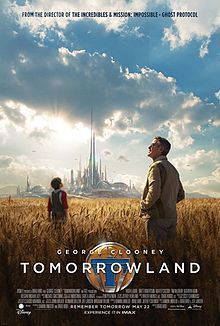 I managed to see Tomorrowland, the new Brad Bird movie, before it was unceremoniously hustled out of the local movieplexes in favor of Jurassic World and Upside Down. Tomorrowland has not done well in the theaters—despite being a sci-fi action-adventure movie starring George Clooney, directed by the man who brought you The Iron Giant, The Incredibles and Mission Impossible: Ghost Protocol, and produced by Disney—and has garnered some criticism for its simple and cynical/optimistic theme.
I managed to see Tomorrowland, the new Brad Bird movie, before it was unceremoniously hustled out of the local movieplexes in favor of Jurassic World and Upside Down. Tomorrowland has not done well in the theaters—despite being a sci-fi action-adventure movie starring George Clooney, directed by the man who brought you The Iron Giant, The Incredibles and Mission Impossible: Ghost Protocol, and produced by Disney—and has garnered some criticism for its simple and cynical/optimistic theme.
And I’m left trying to figure out exactly why.
First of all, Tomorrowland is a beautiful movie, with ever-popular George Clooney as leading man, kids that are smart, cool and not annoying, great special effects, cool fights and chase scenes, humor, robots, alternate realities, an imminent threat to the planet and a crazy bad guy who seems to want it to happen, or is at least too far gone to see the sense of stopping it. The cinematography is excellent, it’s got a great soundtrack, and it leaves you feeling good at the end.
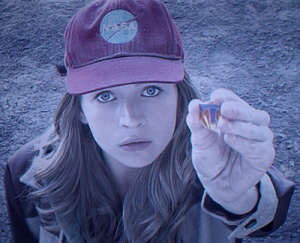 It’s a story about Casey Newton (Britt Robertson), the daughter of a NASA engineer, who finds a strange pin that introduces her to some kind of alternate reality where the world is amazingly futuristic and wonderful; and in trying to get back to it, she’s aided by a mysterious little girl (Raffey Cassidy) who brings her to Frank Walker (Clooney), an adult who’s apparently been there… and was later exiled. Though lethal human-looking robots are trying to stop them, they manage to reach Tomorrowland, and grapple with the Mayor to prevent his machines from destroying our Earth. In the end, Earth is saved, and our heroes help others to make sure Earth will have better days ahead.
It’s a story about Casey Newton (Britt Robertson), the daughter of a NASA engineer, who finds a strange pin that introduces her to some kind of alternate reality where the world is amazingly futuristic and wonderful; and in trying to get back to it, she’s aided by a mysterious little girl (Raffey Cassidy) who brings her to Frank Walker (Clooney), an adult who’s apparently been there… and was later exiled. Though lethal human-looking robots are trying to stop them, they manage to reach Tomorrowland, and grapple with the Mayor to prevent his machines from destroying our Earth. In the end, Earth is saved, and our heroes help others to make sure Earth will have better days ahead.
And isn’t that pretty much what people are asking for from their movies these days? I mean, isn’t that pretty much what you get from all the other big movies out there? So how is it that audiences haven’t been going to this movie? Why is it that critics dismiss it?
Is it that Tomorrowland‘s message—that society has essentially given up the future, but if we gave our best thinkers and creative minds carte blanche to think and create for us, we could have a utopian world in our lifetime—just too much for movie-goers to accept? Is the villain of the piece, Mayor Nix, right when he suggests that people have resigned themselves to imminent doom and disaster just because it demands less effort from them?
Or is it really that the critics managed to poison the public against Tomorrowland and its positive message? Critics aren’t exactly known for responding well to your average action movie, much less your average science fiction adventure movie… and the concept that we can make a better future if we try isn’t exactly the popular zeitgeist of the day. Critics also don’t usually take too well to meta messages that essentially tell them what to think; and Tomorrowland‘s message is about as meta as you can get. So critics have decided to tell the American public that we can’t accept the premise of this movie; that the power of positive thinking is so far beyond us as to be a neon-colored Kool-aid we just won’t drink.
They may have softened their barbs, if this had been intended as a kid’s movie, or if it had been animated… no one takes cartoons and kid’s flicks seriously. But because it was nominally aimed at adults as well as kids, its positive message was unsurprisingly deemed unrealistic, and therefore dumb.
And that’s the sad part about Tomorrowland: That it clearly shows us our self-fulfilling prophesy, our inability to make our world better because we can no longer imagine anything but chaos. With all the brilliant minds at our disposal, with all our technology, the only thing we seem to be able to do with it is imagine wartime scenarios, terrorist targets, machines that will turn on us, jobs we will lose, authorities that we cannot trust, and an environment that we cannot save.
Tomorrowland dares show us the truth: That all of those things, and more, can indeed be fixed—if we decide to fix them. It shows us that we have a choice, that we can stand up, join hands and make this world better than we can possibly imagine.
 Its message is summed up in an exchange between Casey and her father, a riddle introduced early in the story and reinforced at the end: Two wolves fight. One is Despair, and one is Hope. Which wolf wins?
Its message is summed up in an exchange between Casey and her father, a riddle introduced early in the story and reinforced at the end: Two wolves fight. One is Despair, and one is Hope. Which wolf wins?
The answer is: The one you feed.
Coming on the heels of another similarly-themed post, it’s easy to imagine that defeatism may be one of the things that is bringing America low; that we’ve lost our ability to dream, to dare and to innovate our way out of problems. True, when your best efforts have given no results, it’s far too easy to just throw up your hands and give up, to turn your back on a challenge and just let it roll over you. Tomorrowland is pretty sure we’ve already turned our backs, and we’re just waiting until we get rolled over, not long from now. And based on its ticket sales, it seems to be right.
But the movie is also sure that it’s not too late to turn back around. It shows us just what we’re capable of, and it tells us that the only thing we have to do to get there is to try.
Tomorrowland makes no secret about which wolf it feeds. Which one we feed is left entirely up to us.
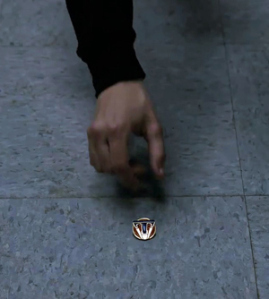
Would you pick it up?


June 26, 2015
The Steed we all should be
 Yesterday, actor Patrick Macnee died at 93. And those of us who grew up watching him play John Steed on The Avengers (the original Avengers, mind you, and the reason the recent superhero movies have to be called Marvel’s The Avengers) are breathing a melancholy sigh, because we miss the actor who embodied the man so many of us wished we could have been.
Yesterday, actor Patrick Macnee died at 93. And those of us who grew up watching him play John Steed on The Avengers (the original Avengers, mind you, and the reason the recent superhero movies have to be called Marvel’s The Avengers) are breathing a melancholy sigh, because we miss the actor who embodied the man so many of us wished we could have been.
An adventurer? Yes, of course. A spy in a science-fictional world of mad scientists, robots and secret labs. But John Steed was so, so much more than that. He was intelligent, savvy, skilled, dashing, confident, erudite, witty, cultured and unflappable. He played a gentleman’s gentleman, a natty figure that James Bond could only admire from afar.
And John Steed was a product of the post-war modern generation: Not only did he refuse to carry a gun, and was still great at his dangerous job; but he worked alongside some of the most amazing women in the world, and never let sex get in the way of work. Again, he was the gentleman’s gentleman, and any lady who stood alongside him knew that her virtue would never be in danger, her gender would never be denigrated, her skills would never be doubted.

Emma Peel, typical of the kick-ass-and-take-names adventuresses that John Steed partnered with.
So was John Steed’s relationship with the characters of Cathy Gale (played by Honor Blackman) and Emma Peel (played by Diana Rigg). Cathy and Emma represented some of the first women adventurers in television that weren’t there just to be rescued by the men, or met in the boudoir after the adventure was over; they were front and center in the action, taking down as many bad guys as Steed. And Steed, rather than being threatened by them or distracted by them, worked efficiently and professionally beside them.
(Tara King—played by Linda Thorson—was also a great and capable agent, but deliberately softened and made to cater to and strongly admire/adore Steed… something Macnee didn’t think worked as well as the Steed-Gale and Steed-Peel relationships. Steed remained professional with Tara, nevertheless.)
This was (in the sixties and seventies) what many of us saw as the future of man-woman relationships—considered by some to be even more civilized than the “sexual revolution” we usually saw on American television, where constant and deliberate sexual tension between equals in name only inevitably resulted in leading men bedding a different woman every week, and the beginnings of “will-they-won’t-they” television.
Lamentably, the antics of James Bond came to be considered the Ideal British Gentleman by the American masses: The man who wears his dangerousness on his sleeve, and cuts ruthless quips as he dispatches his enemies. When John Steed dispatched an enemy, he didn’t revel in it or soften the blow with bad jokes; he noted the regrettable but necessary loss of life, and moved on. He was the consummate professional, in his job, and with his colleagues.
He was also okay with being an anachronism: Wearing Saville Row suits and a bowler (with a bulletproof top), always carrying an umbrella (with a sword hidden in the handle) and driving a monstrous vintage Bentley roadster. Though almost everything in The Avengers was designed to be hyper-British (for the American audiences to ogle), Macnee made John Steed, a caricature in itself, work marvelously. Not only did Americans want England to be just like what they saw on The Avengers, but they wanted their English gentlemen to be just like John Steed. Hell, he even made jowls look cool.
Macnee’s John Steed was admittedly a character out of whole cloth, a type designed to allow foreign audiences to revel in a fairytale version of England. But he (and The Avengers) did it so well that even those of us who were in on the joke, just didn’t care. Patrick Macnee was an icon of American television, and he will be sorely missed.


June 25, 2015
Anti-intellectualism Is Killing America
 I came across two interesting articles that tied in to the Charleston shooting and related gun control debates discussions endless non-starters currently in the news. Both articles made valid points, and at the same time seemed to me to be missing one key ingredient that would really drive their message home.
I came across two interesting articles that tied in to the Charleston shooting and related gun control debates discussions endless non-starters currently in the news. Both articles made valid points, and at the same time seemed to me to be missing one key ingredient that would really drive their message home.
The first article, David Niose’s Anti-Intellectualism is killing America in Psychology Today, does a great job of describing the root causes of hate, racism, violence and other social dysfunctions on a cultural “embrace and exaltation of ignorance.”
“In a country where a sitting congressman told a crowd that evolution and the Big Bang are “lies straight from the pit of hell,” where the chairman of a Senate environmental panel brought a snowball into the chamber as evidence that climate change is a hoax, where almost one in three citizens can’t name the vice president, it is beyond dispute that critical thinking has been abandoned as a cultural value. Our failure as a society to connect the dots, to see that such anti-intellectualism comes with a huge price, could eventually be our downfall.”
Niose’s article was compelling in itself. But following after it was Ravi Chandra M.D.’s rebuttal, also in Psychology Today: No, Self-Centeredness Is Killing America. Ravi argues that racism, hatred, etc, are effects of an even deeper cause: We are very, very self-centered and therefore we believe our own snuff.
“Evolutionarily speaking, as biologist E.O. Wilson has pointed out, we think in terms of in-group and out-group. As long as we are defensive with our group affiliations (racial, religious, national, gender), hatred will be inevitable. Defensiveness occurs on the individual, synaptic level (the amygdala’s reactions to threat), but is propagated and reinforced by sociocultural forces that surround us—from movies and pop culture to neighborhoods to, yes, social media.”
Both articles are worth a full read. But as I read them, one common thread among these arguments quickly occurred to me: That the elements Niose and Chandra are highlighting—anti-intellectualism, self-centeredness—just happen to be exactly the opposite of the key elements that were originally considered the heart and soul of our emerging country.
The tenets of American democracy were founded on an intellectual method of establishing fair and malleable laws, created by learned individuals based on their knowledge of their constituents, and ratified by the votes of an informed public. And America itself was founded on the concept that all men were created equal, and that all Americans would work together to sustain a nation Of the People, By the People and For the People. United we stand, Divided we fall was the mantra of our United States of America.
 And according to Niose and Chandra, we have completely abandoned the intellect and togetherness that founded this country, and have instead come to embrace intentional ignorance and selfishness. Americans have abandoned what it means to be American.
And according to Niose and Chandra, we have completely abandoned the intellect and togetherness that founded this country, and have instead come to embrace intentional ignorance and selfishness. Americans have abandoned what it means to be American.
It’s pretty hard to argue the point. Today this country is controlled by an incredibly rich and powerful few, who buy, bribe and order around politicians to keep themselves in power and wealth, no matter the consequences to the country… and control media and commercial venues to promote their point of view, obscure opposing points, and provide endless distractions to keep most Americans from thinking about them in the first place. They outright encourage ignorance and self-centeredness, because nothing works so well to keep them in power but lack of knowledge of what they are doing and lack of organization to challenge them. Meaningful debates get broken down into catchy but meaningless sound bites that generate constantly-circular arguments, guaranteeing indecision on the street and inaction in official circles while the powerful control their agenda and make their profits behind closed doors. (You wonder why we’re still debating gun control in America? Or why we’re still powering our country with oil and not fighting tooth and nail to reverse climate change? Boom.)
And the collateral damage is seen on the news every day: Ideology-based murders, lack of needed supplies for emergencies, under-financed government departments, lack of affordable healthcare, under-equipped and over-expensive schools, deadlocked governments, global warming, disinformation in the news, bread and circuses in the media, and the latest scheme to hand our hard-earned dollars into their banks to make more money for them.
Is this the inevitable result of the American experiment: Creating a nation that functions only when people use their brains and work together… then giving them ample opportunities to do neither? Will we recover from this anti-intellectualism and self-centeredness in time to recover our country?
Or is the Manifest Destiny of the United States to be taken over by some other country that steps up, grabs the reins and tells us: “You had your fun. Now it’s time for responsible people to drive.”
Well, if that is what happens, don’t fret. Chances are, we won’t actually notice for years.


June 20, 2015
Deathrace 2015
 The recent shootings in Charleston are bringing out the inevitable tut-tutting about the state of the Union, combined with people decrying our present gun laws, and the inevitable gun lovers attacking them for being short-sighted and un-American for criticizing the Second Amendment.
The recent shootings in Charleston are bringing out the inevitable tut-tutting about the state of the Union, combined with people decrying our present gun laws, and the inevitable gun lovers attacking them for being short-sighted and un-American for criticizing the Second Amendment.
America’s irrational gun fixation makes me picture a nation full of drivers afraid of the dangers on American highways… so they speed up, trying to get ahead of the danger. But this makes everyone else speed up, everyone trying to get to the front of the line… resulting in highways becoming more and more dangerous amidst maniacally-speeding drivers.
Until you have small accidents… that become mass accidents… that lead to mass casualties, damage done to the highways and to the lives of everyone caught in the traffic behind the crash.
And still those people cry: “If only I’d gone faster…”
It’s ironic that those who defend the Second Amendment as the final statement on America’s right for private citizens to arm themselves, as guaranteed by our Founding Fathers, manage to ignore two things: One, that our Founding Fathers made it clear that the government of the United States, and its laws, were designed and intended to be malleable as time and necessities changed; and Two, that the very name of the law they defend, the Second Amendment, is a clear indicator that the laws not only can be changed, but have been changed as needed.
And if it isn’t crystal clear that the needs of the nation have changed since then, nothing ever will.
But still Americans insist that the solution to guns is more guns. Look where that’s gotten us. We’ve even imported that attitude, applying it to the Middle East by arming insurgents to take down unpopular governments. The result has been worse governments and more insurgents (which we arm just like the previous guys), growing and evolving terrorist sects, Al-Qaida, ISIS and a forever-destabilized region that now spills out onto the people who originally armed them (you get one guess who).
Micheal Waldman, author of the book The Second Amendment: A Biography, described some of the findings of the research that led to his book in a Mother Jones interview:
“When the Supreme Court ruled in (the Heller Decision), Justice Scalia said he was following his doctrine of originalism. But when you actually go back and look at the debate that went into drafting of the amendment, you can squint and look really hard, but there’s simply no evidence of it being about individual gun ownership for self-protection or for hunting. Emphatically, the focus was on the militias.”
Today, our Militia is the Police, National Guard, Coast Guard, Army, Navy, Air Force and Marines. And unlike the past, when we required our people to bring their own guns when they served (which most Americans almost certainly owned since we were a hunting culture at the time), today our armed forces have their own guns, and are more than willing to hand them to you at the door when you sign up.
And in a country where anything you want to eat can be obtained at your local grocery store, there’s sure no need to hunt. So that’s two reasons for gun ownership taken away.
Leaving the idea of self-protection. Which wouldn’t be nearly as dire, if it weren’t for all of those guns out there… it’s a firearms Cold War, both sides dedicated to mutually-assured destruction, and not waiting for the other side to pull the trigger.
 But now there are defensive and non-lethal weapons that can be just as effective as guns to protect the home. My favorite example is the taser: Tasers can fire an electric jolt that will immobilize an attacker, leaving them unable to fire a gun at you, or do much of anything else, long enough for you to disarm them or run away. Tasers are simple to use, can be fired multiple times (depending on the model), can have a range of a few dozen feet or used at close range, are easily carried, and do not require a license to operate. I don’t own a gun or have a license, but I can legally buy a taser in a store or online, today.
But now there are defensive and non-lethal weapons that can be just as effective as guns to protect the home. My favorite example is the taser: Tasers can fire an electric jolt that will immobilize an attacker, leaving them unable to fire a gun at you, or do much of anything else, long enough for you to disarm them or run away. Tasers are simple to use, can be fired multiple times (depending on the model), can have a range of a few dozen feet or used at close range, are easily carried, and do not require a license to operate. I don’t own a gun or have a license, but I can legally buy a taser in a store or online, today.
And I’ll bet you that any gun-toting criminal is going to think twice about pulling on someone they believe has a taser on them. Those things aren’t fun.
 For other non-lethal weapons, my second favorite is: The extended baton, which allows you to strike an assailant that’s close-in. This weapon has recently been featured on episodes of Elementary, where Sherlock Holmes trained Joan Watson in its use… and she has had occasion to use it against attackers, to good effect.
For other non-lethal weapons, my second favorite is: The extended baton, which allows you to strike an assailant that’s close-in. This weapon has recently been featured on episodes of Elementary, where Sherlock Holmes trained Joan Watson in its use… and she has had occasion to use it against attackers, to good effect.
And there’s nothing like good old martial arts to teach you defensive strategies, how to break holds or disable opponents, and how to keep them at bay. I America’s public schools announced tomorrow that every child would take and pass a mandatory martial arts component before graduating from junior high school, I (and a lot of parents) would only be dee-lighted.
So, if there are non-lethal defensive weapons available to every member of the public… if we don’t need to hunt for food… if our armed forces already have plenty of guns to loan us when we go to serve… and if we have clear evidence that constant escalations in arms are not making us any safer…
…exactly why do private citizens need guns again?
Answer: We don’t. We, as a people and a country, have evolved… just like the Founding Fathers expected and intended us to. It’s time for our lives and our laws to evolve and—ahem—amend, just like the Founding Fathers expected and intended them to.
If we want to be the most intelligent and civilized nation that our Founding Fathers wanted and knew we could be, it’s time to agree to lay down our private arms, systematically track down all the illegal arms, and melt them down into plowshares (or better yet, windmills).


June 19, 2015
Will Libraries Stop Amazon Dominating Ebooks?
A good point by Andrew Knighton… and worth looking into.
Will Libraries Stop Amazon Dominating Ebooks?






